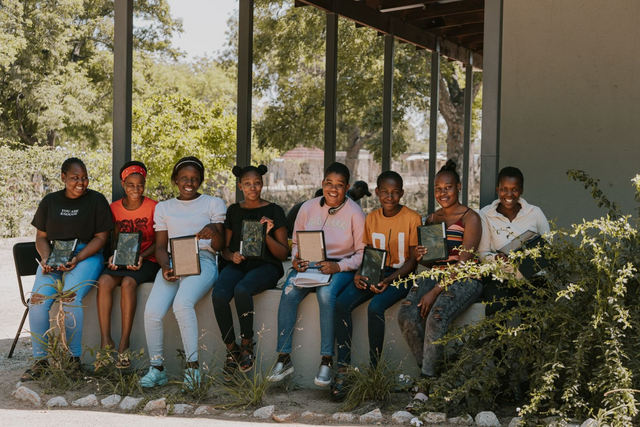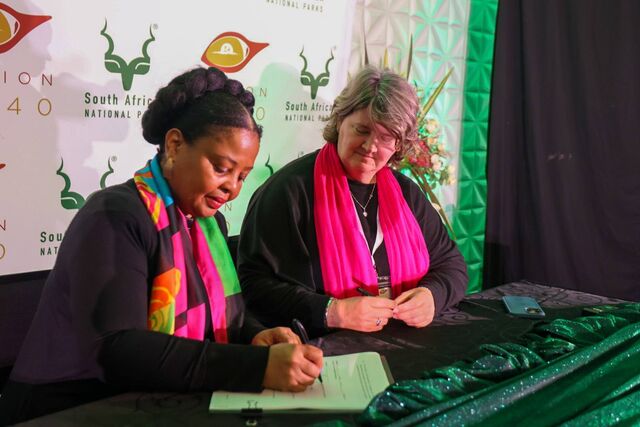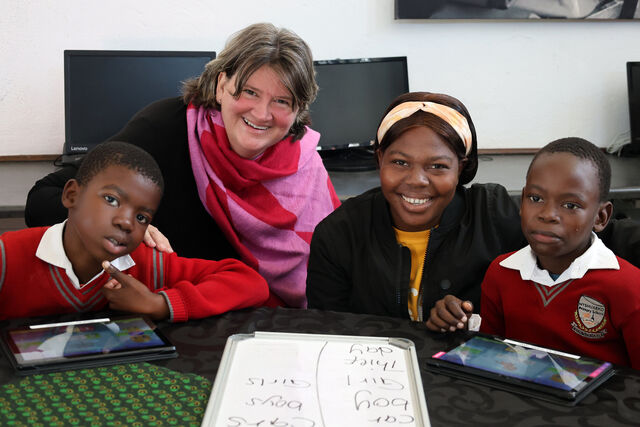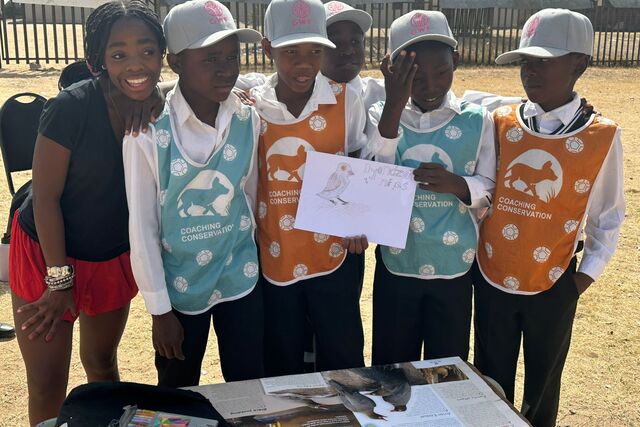Injecting digital life into the classroom: why empowering teachers will empower generations of learners
Good Work Foundation (GWF) is showing rural schoolteachers how to integrate technology into their lessons, enriching them and thousands of learners in the process.
Crispen Bvumbghe, the teacher support manager at GWF, believes civil society and the government should work together more to improve the public education system. Empowering teachers, and fostering a love of continuous learning among both them and their wards, is critical to boosting education outcomes, he contends.
“As a qualified teacher myself, I’m passionate about education because I can see the good that it does in communities,” he says. “And I know that if you empower a teacher, you also empower all the learners they teach every day.”
Bvumbghe helps teachers adapt to the demands of the modern classroom, showing them how to use technology to enhance the learning and teaching experience. “We hear that children cannot read. We hear that children cannot do Mathematics, and that literacy levels are below par. So many critics talk about these things but don’t offer a solution.”

Good Work Foundation
Blowing the cobwebs off disused computer labs
GWF is among those offering a solution. Every year, thousands of learners from 29 rural schools cheerfully learn digital literacy on its six campuses. In many cases, these schools have their own computer equipment – but it’s gathering dust because the teachers haven’t been trained to use it.
“If you put an R850 000 computer lab in a school and no one uses it, it’s a wasted investment,” Bvumbghe notes.
So, GWF has stepped into the breach. Its staff visit schools to offer teachers workshops on using computers, tablets, smartboards and the like to bring their lessons to digital life.
“Ninety-nine percent of teachers don’t know they can access curriculum-based information on these gadgets. We show them how to use technology to excite learners and ignite their curiosity, so there is engagement and an interest to learn,” says Bvumbghe.
“Although we don’t discourage the use of books, we are mindful that if we teach the children of today the way we taught yesterday, we rob our kids of tomorrow. We need to think how we can best prepare our learners for the future.”
Teachers’ newfound confidence in using digital aids in the classroom has been heartening to witness, he says, quipping, “You’re never too old to learn.” Some teachers even come to GWF campuses during school holidays or over weekends for extra training – sacrificing their private time to enrich their digital knowledge for the benefit of their learners.
A teacher’s testimonial
Someone who has witnessed this rural digital revolution first-hand is Cicilia Maggy Sambo, who taught Mathematics at Tfolinhlanhla Primary School in Shabalala, Hazyview, for many years before she retired earlier this year. Mam’Sambo was among the pioneering educators who helped GWF refine its digital education offering more than a decade ago.
“Some of our vulnerable learners would go to Hosanna [the church that shares premises with the GWF Hazyview Digital Learning Campus] after school to get food, and GWF staff would give them books to read. I immediately started seeing an improvement in the children’s reading skills, and approached Crispen [Bvumbghe] to make the sharing of books a more regular thing,” she relates.
Once her learners started attending classes at GWF, she observed a “drastic” improvement in their academic performance – particularly in reading for comprehension. This is no mean feat, since in Grade 4 children switch from mother-tongue instruction to English-medium learning, which is a giant leap for many.
However, Mam’Sambo takes pride in the fact that thanks to GWF, Tfolinhlanhla Primary has become one of the area’s highest-performing public schools. “One of our less privileged learners was admitted to [prestigious independent school] Uplands and another was selected to attend the Oprah Winfrey Leadership Academy for Girls,” she says. “I’ve had people coming to me and saying, ‘My grandchildren can even read the words [subtitles] on TV’ – they now have no difficulty switching from their mother tongue to English.”
GWF has also trained Tfolinhlanhla’s teachers to be computer literate, but better internet connectivity in rural areas would enhance technology-driven learning even more, Mam’Sambo believes.

Good Work Foundation
Seeding fresh ideas into the education system
GWF also runs a Facilitator Academy that trains facilitators for the non-profit’s various learning programmes. These vibrant young educators are coached on how to inject joy and fun into learning, with creativity, interaction and digital literacy (including coding and robotics) underpinning lessons.
Academy manager Bheki Mashaba trains about 20 facilitators a year, many of whom are reabsorbed into GWF as staff. Others are placed in schools as part of the Youth Employment Service (YES) programme or enrol for teaching qualifications, seeding the GWF philosophy of wonder-filled, hands-on learning far and wide.
“We equip our students to understand the importance of ensuring the learning environment is friendly and welcoming,” he explains. “We train them to be emotionally intelligent, and to understand that some kids learn differently. We also empower them to use gadgets so that when they go into schools, they can make sure computer equipment is used to full effect.”
He believes that new ideas are needed in the education system to get kids excited about learning. “I think it’s high time that we get more young people who are fresh and energetic, and who want to be of service, involved in schools.”
Digital tools are merely a method of delivering information in an engaging way, but the fundamentals of teaching remain unchanged, says Bvumbghe. “No computers will replace teachers; no tablets will take their jobs – because human beings need each other. Education is not just about learning ABCs; it’s about the valuable social contact that teachers provide.”

Good Work Foundation
Good Work Foundation





